|
|
|
Sort Order |
|
|
|
Items / Page
|
|
|
|
|
|
|
| Srl | Item |
| 1 |
ID:
130589
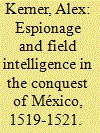

|
|
|
|
|
| Publication |
2014.
|
| Summary/Abstract |
Among the influential factors in the Spanish conquest of the Aztec empire in the sixteenth century, intelligence played a significant role. Information from field and diplomatic sources proved to have a decisive role in planning combat tactical moves as well as in the diplomatic and political contacts accompanying the military campaign. Both sides realized the importance of intelligence and used it as part of their military and diplomatic policies. This paper explores the types of intelligence sources and information-gathering systems available to the two sides in the fateful events of 1519-1521, and analyses intelligence's impact on the outcome of this momentous milestone in the New World's history.
|
|
|
|
|
|
|
|
|
|
|
|
|
|
|
|
| 2 |
ID:
144937
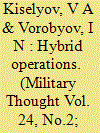

|
|
|
|
|
| Summary/Abstract |
The authors give their view of hybrid operations, a new type of warfare that is actually the annexation of a part of a target country, and take a close look at the basic components of hybrid warfare that have a decisive effect on the conduct of hybrid operations.
|
|
|
|
|
|
|
|
|
|
|
|
|
|
|
|
| 3 |
ID:
150082
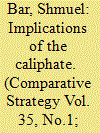

|
|
|
|
|
| Summary/Abstract |
Regardless of the outcome of the military campaign, the “Islamic State” is a watershed. Its regime derives from the personage of the Caliph as the “Substitute of the Prophet of Allah” and “Commander of the Believers.” But it seeks not to restore the model of previous Caliphates, but to resurrect the regime of the Prophet who spread Islam “with the sword” so that “the word of Allah becomes supreme.” The Caliphate paradigm is incompatible with tolerance of heterodox Muslim communities or non-Muslim citizens or with peaceful relations with other Muslim states or the non-Muslim world. It precludes a “Westphalian” order; will exacerbate the Sunni–Shiite conflict, radicalize Muslim communities across the globe, fan the flames of Islamist terrorism and will give birth to “Caliphate Archipelagos”—small groups that swear their loyalty to the Caliph and are willing to act in his name in their territories.
|
|
|
|
|
|
|
|
|
|
|
|
|
|
|
|
| 4 |
ID:
082421
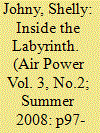

|
|
|
| 5 |
ID:
115344
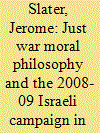

|
|
|
|
|
| Publication |
2012.
|
| Summary/Abstract |
The 2008-09 Israeli military campaign in Gaza, commonly known as Operation Cast Lead, is best understood in the context of Israel's "iron wall" strategy. During the 1930s, the strategy emphasized the need for overwhelming military power to break Arab resistance to the establishment of a Jewish state in Palestine; since the creation of Israel in 1948, it has continued to be at the core of Israeli policies in the overall Arab-Israeli conflict. From the outset, the strategy has included attacks on civilians and their crucial infrastructures. Such attacks violate the just war moral principles of discrimination and noncombatant immunity. In addition, Cast Lead violated the just war principles of just cause and last resort, which state that wars must have a just cause and even then must be undertaken only after nonviolent and political alternatives have failed. Israel did not have a just cause in 2008-09, because its primary purpose was to crush resistance to its continuing de facto occupation and repression of Gaza. Further, Israel refused to explore the genuine possibility that Hamas was amenable to a two-state political settlement. Thus, the iron wall strategy and Operation Cast Lead, in particular, have been political as well as moral failures, undermining rather than serving Israel's genuine long-term security needs.
|
|
|
|
|
|
|
|
|
|
|
|
|
|
|
|
| 6 |
ID:
132805
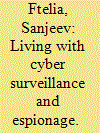

|
|
|
|
|
| Publication |
2014.
|
| Summary/Abstract |
Surveillance and espionage have existed for time immemorial. While they were always a part of any military campaign and study, private lives of ordinary citizens were generally not much affected by such activities. Things are not the same anymore. With the internet invading into our lives like never before, we today live under constant surveillance of multiple agencies like the government, your employer and perhaps your friends and neighbours. While a lot has been written and spoken about surveillance using land, sea, air and space, not much is heard about the surveillance using the fifth domain - the cyber space.
|
|
|
|
|
|
|
|
|
|
|
|
|
|
|
|
| 7 |
ID:
115907
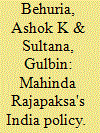

|
|
|
|
|
| Publication |
2013.
|
| Summary/Abstract |
Mahinda Rajapaksa has emerged as perhaps the only Sri Lankan leader who has managed to secure some strategic autonomy in conducting his country's foreign policy vis-à-vis India. He engaged India effectively during the military campaign against the Liberation Tigers of Tamil Eelam (LTTE) and simultaneously countervailed India by improving his country's relationship with India's traditional adversaries such as China and Pakistan. In the post-LTTE scenario, he has maintained a defiant posture vis-à-vis India over the latter's persuasion to evolve a political solution to the ethnic issue. Backed by a nationalist upsurge at home and support from countries such as China, he may continue with his policy of bypassing Indian pressures and persuasions in the coming days. Against this backdrop, the article raises the following questions and seeks to answer them. Does Rajapaksa's India policy signify a typical quest for strategic autonomy by a smaller state vis-à-vis a larger neighbour? Can this be explained as an effort to offset India's overwhelming influence on Sri Lanka? How is his 'India policy' different from that of other leaders? Does he display a unique style of leadership compared to his predecessors? How far has he succeeded in counterbalancing Indian influence? What are the reasons for his success or failure? What are the implications for India and how can he be effectively engaged?
|
|
|
|
|
|
|
|
|
|
|
|
|
|
|
|
| 8 |
ID:
036788
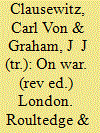

|
|
On war
/ Clausewitz, Carl Von; Graham, J J (tr.)
|
1966

|
|
|
|
| Edition |
rev ed.
|
| Publication |
London, Roultedge & Kegan Paul, 1966.
|
| Description |
v.2 (vi, 415p.)
|
|
|
|
|
|
|
|
|
|
|
|
Copies: C:1/I:0,R:0,Q:0
Circulation
| Accession# | Call# | Current Location | Status | Policy | Location |
| 000157 | 355.021/CLA 000157 | Main | On Shelf | General | |
|
|
|
|
| 9 |
ID:
157577
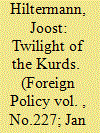

|
|
|
| 10 |
ID:
115006
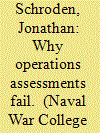

|
|
|
|
|
| Publication |
2011.
|
| Summary/Abstract |
In any military campaign, commanders, politicians, and the general public all desire to know whether the effort is succeeding. For conventional conflicts, well
developed theories of war give a good understanding of the objectives to pursue
and how to pursue them. These theories also enable the derivation of well defined metrics for progress, such as terrain held, numbers of enemy fighters killed
or captured, or amount of enemy equipment and materiel destroyed. In unconventional conflicts the theories of war are more complex, objectives and ways to
achieve them are less straightforward, and notions of "winning" and "losing" are
more difficult to define. As a result, it is also more difficult to gauge and demonstrate progress in such conflicts. For the specific case of counterinsurgency, however, gauging and demonstrating progress is at least as important as in a conventional war, since the former tends to last longer and therefore requires sustained
political and public support to conduct-and such support is often tied to proof
of progress. Thus operations assessment, designed to show whether progress is
being made, should be a vital part of any unconventional conflict, especially
counterinsurgency.
|
|
|
|
|
|
|
|
|
|
|
|
|
|
|
|
|
|
|
|
|